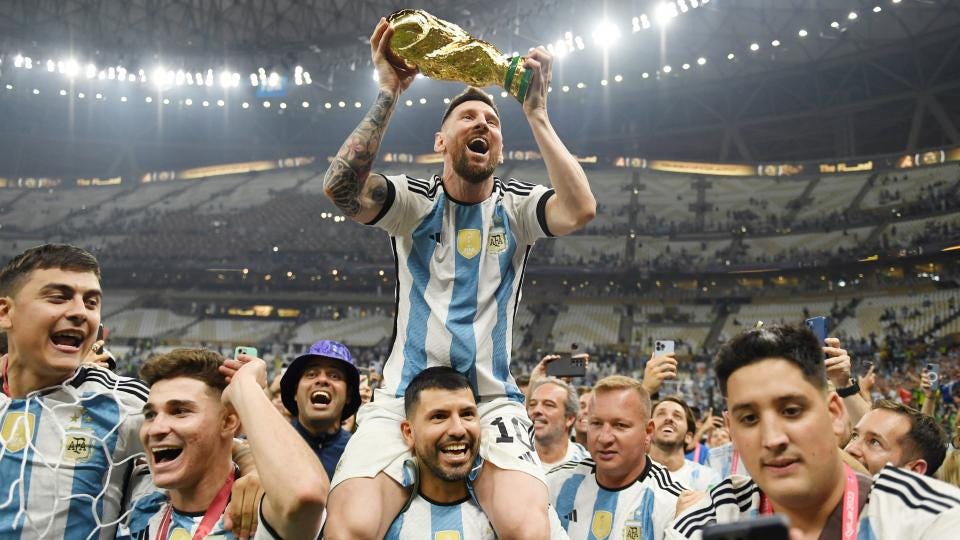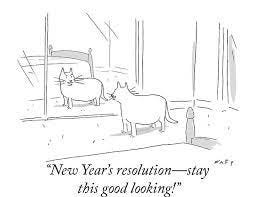Living Messi: What One of Soccer’s (Football's) Greatest Can Teach Us About Achieving Our Goals
In this issue: Living Messi: What One of Soccer’s (football) Greatest Can Teach Us About Achieving Our Goals / Leadership tips from the US men’s soccer head coach / Leadership tips from the US men’s soccer head coach / The benefits of not being a jerk to yourself / The Lighter Side of Goals
Why you’re getting this:
I'm Andrea J. Miller and this is my “On Leading Well” Newsletter. I send this to people in my networks, people I’ve met recently, and friends I want to keep in touch with. You can unsubscribe (SEE THE VERY BOTTOM OF THE EMAIL) anytime, I won’t be offended.
Living Messi: What One of Soccer’s (football) Greatest Can Teach Us About Achieving Our Goals (Bad Pun Intended)
Yes, it’s what you’ve been waiting for, another World Cup story about Messi.
This is despite the fact that I don’t even follow soccer/football…but Lionel Messi is a career worth recognizing.
At 35, he’s been playing professionally for almost 20 years and (like many in the game) has been kicking the ball almost since birth.
His World Cup performance is a culmination of a lifetime's work and passion for the game.
Yet it’s also a career that almost didn't happen…
As a boy, he was problematically small for his age… and showed no signs of growing.
At 11 he was diagnosed with a growth hormone disorder.
Eventually, his family found their way to FC Barcelona, the football club that funded his expensive treatments and where he’d spend most of his career.
As he grew both in height and stature (don’t confuse the two), he won countless titles and awards…yet, until last Sunday one still escaped him.
At 35, he’s considered old by soccer standards.
It was likely his last chance to obtain the one goal that eluded him.
Though still considered one of the world's greatest, he’d lost some of his quickness…
But he had the humility to know that if he wanted to win, he couldn’t play the way he had earlier in his career
In a great piece in The Atlantic, Frank Fourier wrote about how Messi, aware his legs weren't what they used to be, needed to be strategic in how he managed his energy and movements and how he worked with his team on the soccer pitch.
He’d long had a reputation for being a driven introvert, but he embraced his role as a leader, taking responsibility for his less experienced teammates (in fairness, almost everyone in the league is less-experienced).
The win wasn’t his, it was theirs…and in this are the greatest lessons.
It’s easy to think that Argentina won because of Messi’s 7 goals, but France’s Mbappe led with 8.
What was less discussed was his tournament-leading (along with several others) 3 assists, which helped others on his team score.
Life and work aren’t so different.
As our careers and lives progress, there’s value in living and being more like Messi, adapting to personal and situational changes; optimizing our strengths and using our finite resources more wisely, and perhaps most importantly, recognizing that we can’t do it alone.
The reality is that our successes are rarely a solo endeavor, but a team sport.
And rarely do they go as planned.
Our ability and willingness to change our “game” as well as recognize our current ability to “play” (like Messi did) is inextricably linked with our ability to achieve our goals and get the “win”.
Rules of the Game:
1) Play to your strengths: in the Atlantic piece that I mentioned above, the author contrasted Messi’s strategic, team play with his contemporary Cristiano Ronaldo, noting that the latter tried to play as he did at the beginning of his career, with poor results. He was seen as a more selfish player, and lacking energy. His team was defeated in the quarterfinals.
What are your greatest strengths and how can you best utilize them to support your team’s overall goals
2) Life is a team sport: while one person takes the shot, it takes the whole team to score a goal. When we try to go it alone, we usually end up working harder with less return.
How can you support others on your team to achieve greater overall success?
3) Adversity has its Advantages: Messi almost didn’t make it as a pro soccer player. He faced difficult physical challenges as a boy, which made him work that much harder as he progressed in the league. Ironically it’s his height, which almost kept him out that’s now thought to be one of his greatest advantages. His low center of gravity and shorter running stride means he can decelerate more quickly, anticipate changes in motion and accelerate more quickly.
Which of your perceived weaknesses may, in fact, really be a strength?
Happy Holidays!
—
The Lighter Side of Goals
—
RECOMMENDED LISTENS, READS And other interesting things
Leadership tips from the US men’s soccer head coach
Gregg Berhalter led a young US men’s soccer team into the knockout stages of the World Cup in Qatar. It was a respectable performance, with the US coach employing tactics instructive to leaders in other fields as he built a team culture ahead of the tournament.
The benefits of not being a jerk to yourself
In a wise, funny talk, meditation advocate Dan Harris shares his quest to improve his relationships with everyone (starting with himself) and explains how to boost your resiliency, quiet your inner critic and simply be more pleasant to be around
—
Executive Coaching Office Hours (EXCLUSIVE FOR READERS)
Ask me ANYTHING leadership, career or wellbeing-related for free, 1-on-1 (REALLY)
Click the link to schedule a time.
—
Are there any other subjects you want me to cover? Hit “Reply” and tell me!
I love hearing from you :)!
—
If you enjoyed this newsletter, please forward to a friend (or 5 :) or someone you feel would benefit from reading it!
Andrea J. Miller
+1 (646) 556-5401 (Whatsapp)




